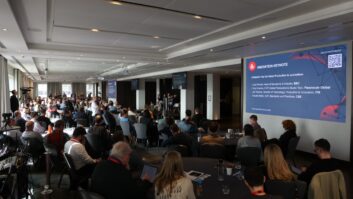There is little doubt that the broadcast industry is currently in its most intense period of change since the transition from analogue to digital broadcasting began around the year 2000. From the adoption of cloud-based workflows for all kinds of production to increasing the automation of core processes across the production and media supply chain, new technologies are having a profound impact on the way that content owners, broadcasters and service providers operate.
Moreover, the fact that workflows and processes are evolving so rapidly now renders the entire decision-making process more fraught and vulnerable to error. Just think of how quickly the cloud has been integrated into broadcast workflows, including those employed for the production of premium live content. A few years ago, such a wholesale shift would have been unthinkable as the on-premise model was so dominant. Or consider the unprecedented shift towards home-working for production and operational staff and on-air talent that has taken place as a result of the pandemic. Once again, not so long ago few would have felt confident about implementing an approach in which so many essential tasks are conducted outside the broadcast centre, but now it almost seems like second nature.
All of which means that delivering long-term business transformation projects in the media and broadcast space is becoming more problematic. There is a good chance that a project initiated today with even a one to two-year timescale will no longer be relevant when it has finally been delivered. And with competition increasing and margins getting tighter, that’s an outcome which no one wants to confront.
At Three Media we have given this predicament a lot of thought over the last 18 months, and it is our view that all transformation projects need to incorporate a period of reflection and re-evaluation. We have developed a ’30-Day Challenge’ to address this need, which means we can analyse a company’s operations and produce a strategy outline for positive change within the 30-day timeframe. Collecting data and subjecting it to rigorous analysis, this process can be applied equally to existing workflows as well as those in the midst of transformation.
It’s not always easy to know precisely when to stop and re-evaluate, although it’s probable that the pandemic has made this more straightforward in some cases. With working practices changing quickly and more hybrid working on the way, now would be an ideal moment to consider if an in-progress project is really going to deliver the capabilities that are required long-term. Indeed, it could be that changes have been made ‘on the fly’ as requirements began to change, and that in itself could be a red flag. A few months on those adjustments might not seem so relevant or cost-effective, meaning that a hiatus is almost certainly a wise move.
Objectives and end-goals
Outside of the uniquely challenging circumstances of a pandemic, the normal red flags include a project that is proceeding behind schedule or over-budget. Once again, using the 30-Day Challenge could make a huge difference in ensuring that the objectives of the transformation are still appropriate to the needs of the business. The larger the project, the more advisable it becomes to schedule regular re-evaluation periods.
Any well-planned scheme begins with the definition of clear objectives, end-goals and financial consequences. It therefore follows that making sure these are on the way to being met is fundamental to any review stage. But with no sign of a let-up in the pace of industry change, there is now a strong argument for more granular evaluation – for instance, really drilling down into the specifics of a new workflow or service model and re-justifying the reason for continued implementation – to take place every couple of months. In other words, adopting an ‘agile’ approach to transformations, providing the opportunity to review, reflect and adjust the next steps.
Just consider some of the implications that recent events could have for major infrastructural projects. It could be that you no longer require all of those new edit suites now or need so much on-premise server and storage capacity as hybrid working means that basing operations in the cloud is the practical option. So perhaps a more compact and less cost-intensive facility would suit the operation better as workflows remain in flux.
Our experience across a wide range of broadcast projects over many years confirms that time spent re-evaluating a long running transformational exercise is always time well-spent. A pause period of 30 days can often be sufficient to catch potential problems at an early stage ensuring that the project stays on track. And to validate the change prior to implementation, a product such as Three Media’s own XEN:Pipeline – which is a new generation content management system that provides comprehensive ‘what if’ workflow analysis and optimisation – can pave the way to extra efficiencies. In particular, cutting-edge AI technology allows users to predict bottlenecks and under-utilisation, making it easier to implement effective workflow refinement.
With workflows evolving to accommodate new production formats and hybrid working set to spread through the industry, it could be that we will ultimately see an end to huge multi-year projects. Instead, it may make more sense for broadcasters and media companies to focus on shorter, more concentrated blocks of work. In the meantime, though, there is everything to be gained from calling project teams together and suggesting that everyone pause and take stock. It may seem disruptive and it might not be too popular with colleagues eager to get a project agreed and executed. But in an industry where the cycle of change is accelerating, we would recommend it is really the only way that effective and successful long-term transformation can be achieved.





